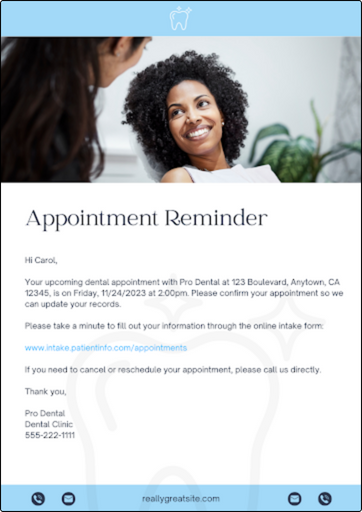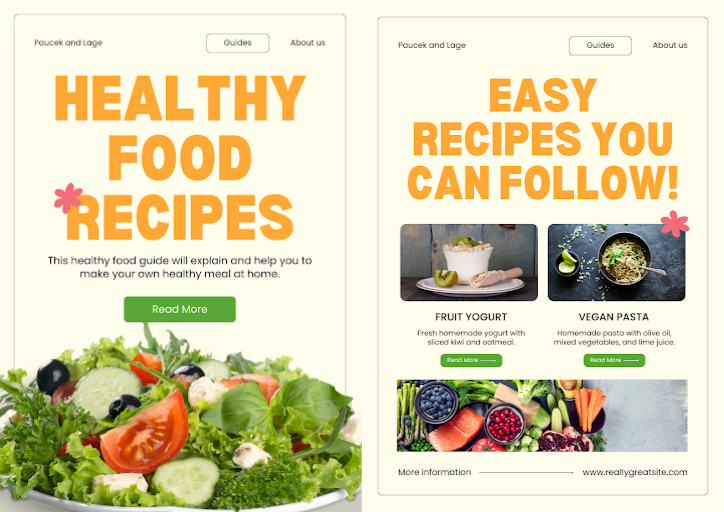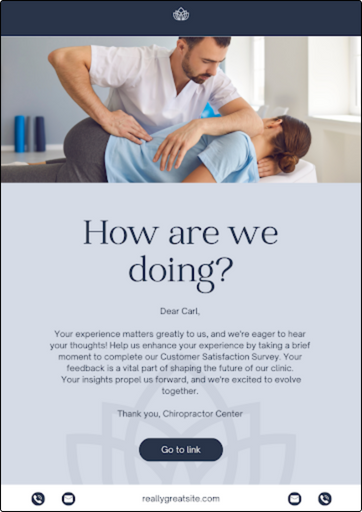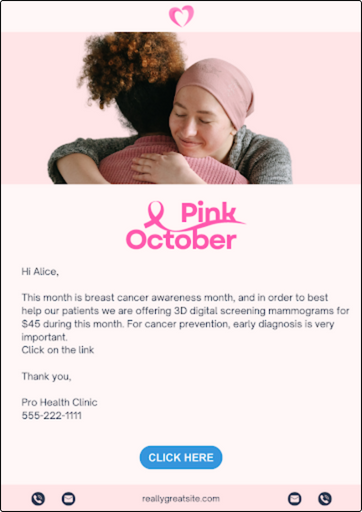Healthcare Email Marketing: A Guide
Healthcare Email Marketing: A Guide
By Kiwi Health
Published: Oct 19, 2023

Email marketing is an indispensable tool for healthcare providers. And it’s a key part of a multi-channel marketing strategy. In this guide, we answer why healthcare email marketing matters. We also offer how tos and tips for success.
In today’s digital world, healthcare providers have to deliver exceptional medical services and stay visible and accessible to patients. Email marketing is a powerful way for providers to do both.
Whether you operate a small clinic or a larger medical practice, using email marketing is a game changer. It lets you strengthen your relationships with patients, enhance communication, and grow your practice.
What Does Email Marketing for Healthcare Professionals Involve?
Email marketing for doctors and healthcare professionals is the practice of using email as a tool to attract and communicate with patients. It’s also used to build trust and promote services. It ideally involves sending targeted, relevant content to patients by email, such as newsletters, appointment reminders, health tips, and updates on clinic offerings.
Email marketing lets healthcare providers connect with patients on a personal level. It’s also cost-effective and an efficient way for large hospitals and small medical practices to engage with their patient base.
4 Ways Email Marketing Is Important for Healthcare Professionals
No matter the size of a healthcare practice or budget, email marketing has a big impact on patient engagement, trust, education, and data-based decision-making.
Here are 4 benefits healthcare professionals get from email marketing.
1. Engaging Patients
Email marketing is an ideal way to foster patient engagement, which is essential for any healthcare business. Through regular emails, healthcare providers can keep patients informed and connected and benefit both their patients and their practice.
For example, consider a family clinic that regularly sends personalized appointment reminders, preventive care tips, and wellness newsletters to its patients. That consistent engagement helps keep patients on track with their treatment plans and strengthens the doctor-patient relationship.
2. Building Trust
Building trust with patients is key to effective healthcare. And email marketing helps practitioners build and maintain trust. When healthcare professionals consistently deliver value to patients, patients are more likely to be confident in the practitioner’s expertise and services.
For example, if a chiropractic clinic sends monthly emails that include educational articles on posture improvement, exercises, and patient testimonials, over time, patients come to trust their chiropractors’ advice and the clinic’s commitment to their well-being.
3. Educating Customers
Educational outreach is an ideal way to use healthcare email marketing. When healthcare providers use emails to educate patients about health-related topics, preventive care measures, and available services, they empower patients to make informed decisions about their health.
For example, a dentist who sends quarterly emails explaining the importance of regular dental checkups, proper brushing techniques, and the latest advancements in dental care, has patients who:
- Learn how to maintain their oral health, which can lead to more proactive dental care decisions.
- Appreciate their dentist’s proactive consideration of their health and well-being.
4. Data Collection and Information
Email marketing platforms offer valuable data that providers can harness to refine their marketing strategies and content. This data-driven approach ensures practitioners can optimize their emails for patient needs and better results.
For example, say a physical therapy clinic tracks its email open rates and click-through rates to gauge patient interest in its various therapeutic programs. By analyzing the data, they see which treatments resonate most with patients and adjust their marketing efforts to match. The result is higher engagement and more appointment bookings.
Best Practices for Using Email Marketing for Doctors and Medical Providers
Now that we’ve covered how email marketing benefits a practice, here’s how to go about maximizing it as a tool to enhance patient care and grow a healthcare business.
1. Segment Your Email List
Segmenting an email list means dividing it into groups (or segments). Segments are key to personalized patient engagement. By categorizing your patients based on demographics, medical history, and preferences, you can tailor your emails to resonate with each group.
Tools such as Mailchimp, Constant Contact, and others, let you collect patient email addresses and segment them. You can also use them to create and send your emails and track data.
For example, imagine a pediatrician’s office that uses an email tool and segments its email list. It can send parents of infants emails about essential baby care, while it sends those with toddlers content on toddler-proofing homes and dealing with common childhood illnesses. For parents of school-age children, the practice shifts the focus of emails to school health and preventive care. This lets the practice give each group information most relevant to their child’s stage of development.
2. Use Email for Appointment Reminders
Appointment no-shows disrupt the flow of a healthcare practice. They also inconvenience both patients and providers. Automated email appointment reminders are a game-changer in reducing no-shows.
For example, a dental clinic can send automated reminders a week before a scheduled teeth-cleaning appointment. The email contains a friendly message reminding patients of their upcoming appointments. It also includes a link to confirm or reschedule. This proactive approach not only reduces no-shows, but makes it convenient for patients to manage their appointments.

3. Send Health Tips and Newsletters
Educating patients about their health is a key part of healthcare email marketing. Regularly sharing health tips, updates, and even newsletters keeps patients informed, engaged, and proactive in managing their well-being.
For example, if a general practitioner sends out a monthly newsletter, they can include articles on healthy living, seasonal health tips (like staying hydrated during summer or flu prevention in winter), and updates about new clinic services. And patients look forward to receiving valuable information that empowers them to make healthier choices.

4. Feedback Surveys
Getting patient feedback helps practices improve patient experiences. Email surveys provide a convenient way to gather insights into patient satisfaction and areas for improvement. Easy tools to use for surveys include Google Forms, TypeForm, and Survey Monkey.
An example of using surveys includes a physical therapy clinic sending out surveys after each session. Patients can easily provide feedback on their experience, including the therapist’s approach, the facility’s cleanliness, and the effectiveness of the treatment. This feedback loop lets the practice deliver continuous improvement in its quality of care and patient experience.

5.Share Promotions and Special Offers
Promoting special offers and discounts through email is a powerful way to encourage patient visits, especially for specific health awareness campaigns or seasonal checkups.
For example, during Breast Cancer Awareness Month, a women’s health clinic might offer discounted mammograms to its email subscribers. The offer not only encourages regular checkups but also shows the clinic’s commitment to its patients and women’s health.

It’s Never too Late to Take Advantage of Email for Your Health Practice
In the digital age, healthcare email marketing is a valuable way for healthcare providers, including small clinics and medical practices, to grow their patient base and increase patient engagement. With email marketing, healthcare professionals foster trust, provide valuable information, connect with patients, and promote their services cost-effectively and easily.
Other ways providers can simplify growing a practice, in addition to email marketing, is to explore Kiwi Health’s all-in-one patient growth solution. With Kiwi Health, practitioners take advantage of advanced patient engagement strategies that let them concentrate on what they do best – provide caring, exceptional healthcare.
Subscribe for more tips to grow your medical practice
We work with private practice builders to deliver their latest insights directly in your email!
